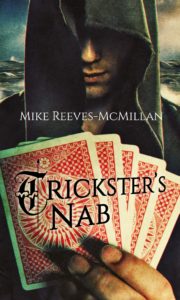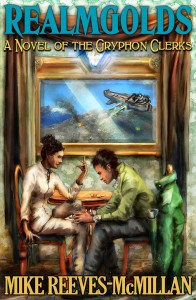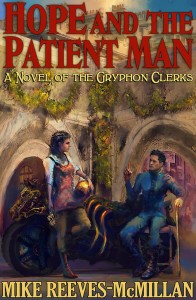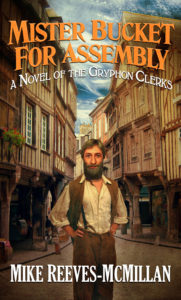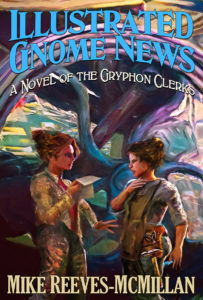The last of the four interview videos. I’ve uploaded this one at higher resolution (“broadband” instead of “ISDN”). I may go back and do the same for the second and third (the first is at about the same resolution as this one).
Transcript:
Q: You dedicated your book to your late father, who taught you to be an honest man, you say. Are you the Innocent Man?
A: I wish I was, in a way. I’m not. My blog – or one of my blogs – is called the Innocent Man, but it’s an aspiration rather than an attainment. And I think that you can become, if not innocent, at least simple-hearted, and that in a way that’s the goal of a lot of spiritual practice, a lot of spiritual teaching, that you once again gain the straightforwardness that Bass is displaying. So I would like to be.
Q: Going on to what is happening outside of your story – like the Narnia series and Tolkien’s trilogy, is this story a spiritual metaphor wrapped in Renaissance narrative?
A: It’s… like Narnia and like Tolkien, it’s not intended as an allegory. It has aspects of metaphor, as I’ve already talked about with the masks being a metaphor for the way that we portray ourselves as people that we’re not, or as people that we are. I think it’s kind of its own thing, it is what it is, but inevitably that reflects on questions like identity and intent and how we present ourselves to other people.
Q: So if, boiling it down further, if your book were to be studied by 7th-form English classes in the future, what would students study as themes?
A: Definitely identity, the masks are all about identity. And roles, roles that people play.
Q: And when it came to answering in their school exams “What was the author trying to say in writing this novel”, what would a good answer be?
A: Ooh. They say if you want to send a message, call Western Union, but I suppose what I was saying is… a lot of it’s encapsulated in Tamas’s sermon, actually, that very hypocritical sermon which he preaches about being who you appear to be while he’s being somebody else. Yes, it’s saying we all have the ability to be authentic and we should strive towards that. And that when you’re at your most authentic that is when you’re at your best, in a way.
Q: Linguistically, you do some language tricks in there. Where would you say you learned to work with language like that?
A: Well, my degree is in English. I studied a lot of 16th and 17th-century literature, also Middle English and Old English, but most of what I studied was language. So that kind of gave me a feel for language and a feel for manipulating it. And the language of City of Masks isn’t actually late-medieval or early-Renaissance English, though it gives the flavour of being. It’s closer to 18th-century really, for more accessibility as much as any other reason, and because it’s easier to write. But I was setting out for a tone of antiquity and formality – there’s a lot of formality in the City of Masks.
Q: There are no contractions, are there?
A: No. Actually, I did find one when I was podcasting it, when I was reading it aloud. I found one “don’t”, I think.
Q: Who says it?
A: Bass. But that was a mistake on my part.
Q: It was a slip.
A: It was a slip, yes. And I tried also to give each of the characters a distinctive voice. That came out much more when I was doing the podcast, obviously, when I could speak in a different voice. But Corius is the only one who says “yea” and “nay”, for example. Everyone else says “yes” and “no”. And that sets Corius off as being, despite his education, a member of a different social class, with perhaps a little bit of a dialect.
Q: And what of Corius? Is he the only male self-possessed enough in the story to deny the Countess’s advances, and does this explain his mysterious disappearance?
A: Well, sometimes you just have to not explain things, and I deliberately didn’t explain why Corius got into the trouble that he got into, because the story stands without knowing that. It tells us about the Countess, is its function, rather than necessarily needing to be a mystery that we have the answer to.
Q: We can only imagine what it was like. Well, any final comments?
A: Well, I have to say it’s been tremendous fun writing the book and also semi-dramatizing it, reading it aloud, doing the various voices. I really regretted when I was doing it that I hadn’t given the Countess more lines, because her voice is wonderful to do.
Q: Can you give us a demo?
A: “I am hinting to you, Bass.” She has that rich, honeyed voice that is full of threat and possibilities.
Q: Which he instantly picks up on when she comes by his ear at the beginning. There’s definitely – that scene has weight, that she’s someone to look out for.
A: Yes, the Countess stands out in any company. She’s always at the centre. She’s the spider at the centre of the web. And one of the people who read it said, “I wanted to hear more about the Countess, I wanted to see more of her.”
Q: You have to get out the psychology books, don’t you, to understand her, given her family happenings.
A: Yes, she’s definitely a bit of a mess.
Q: A psychotherapist’s dream. Especially with the havoc she wreaked.
A: Yes. But Bass was tremendously fun as well to do, the ponderousness and the… I’m sure a lot of my listeners think I’m much larger than I am, and will be surprised if they watch these videos to see that I’m actually quite slightly built.
Q: And very tall.
A: Yes.

